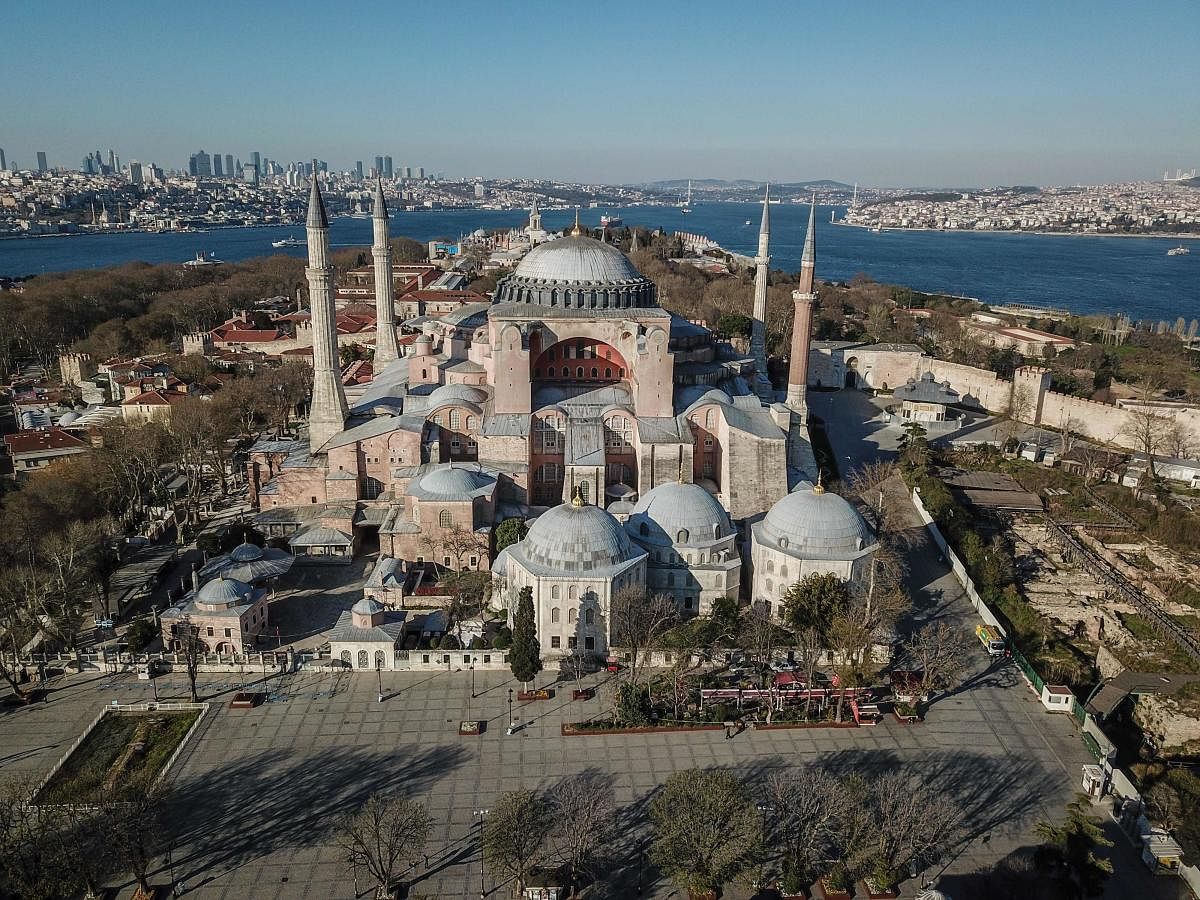
“He is a weak ruler who needs religion to uphold his government; it is as if he would catch his people in a trap. My people are going to learn the principles of democracy, the dictates of truth, and the teachings of science.”
Mustafa Kemal Ataturk, ‘Father of modern Turkey’
A sixth-century Byzantine-era structure, originally built as an Eastern Orthodox patriarchal cathedral by Byzantine Emperor Justinian I, was converted into a mosque by Ottoman Sultan Mehmet II after capturing Constantinople, the present-day Istanbul, in 1453. After the Kemalist revolution, the Hagia Sophia became a symbol of the modern Turkish Republic, founded by Mustafa Kemal Ataturk in 1923. To restructure Turkish society and polity on the model of European nation-states, the founding father of modern Turkey adopted secularism as one of the constitutional principles of the new Republic. As part of the top-down secularisation reforms in the country, which banned the wearing of fez, made purdah illegal and abolished the Caliphate, Ataturk also closed down the imperial mosque Hagia Sophia in 1930 and reopened it as a museum in 1934, with a cabinet decree to strengthen Turkey’s secular credentials and establish a clean break from its Ottoman past. Today, President Erdogan’s decision to reconvert the Hagia Sophia into a mosque strikes at the heart of Turkey’s secular values. At the same time, it also indicates the triumph of religious conservatives in Turkey vis-à-vis the legacy of Kemal Ataturk, also known as the ‘Father of Turks’.
Interestingly, since Ataturk is still a revered figure in Turkey, President Erdogan has never directly attacked him in any of his speeches. On the contrary, he constantly targets the Left-leaning and secular CHP, Turkey’s grand old party formed by Ataturk, for monopolising Ataturk’s legacy. However, since coming to power in 2002, President Erdogan has repeatedly undermined everything that Ataturk had built and prized -- most significantly, Turkey’s secular history in favour of its Ottoman and Islamic heritage.
On the domestic front, he has embarked on a plan of Islamising the State through various social engineering tools such as lifting the burqa ban, limiting the sale of alcohol, attempting to criminalise adultery, initiating a programme to Islamise the country’s education system. On the foreign policy front, in his speeches, Erdogan frequently claims all former Ottoman lands -- from North Africa to Sarajevo. In 2012, euphoric about the possibility of the fall of the Assad regime in Syria, he famously declared: “Inshallah, we will go to Damascus to hug our brothers. That day is close. Inshallah, we will read al-Fatiha at the tomb of Salahuddin and pray at the Emevi mosque there.”
President Erdogan’s conversion of the Hagia Sophia into a mosque goes against the idea of ‘The Alliance of Civilizations’ (AoC), a UN initiative, which Turkey launched in collaboration with Spain in 2005. The initiative aimed at reducing the mutual suspicion, fear and polarisation between the Islamic world and Western societies.
The decision on Hagia Sophia also indicates how President Erdogan’s pan-Islamist ambitions have taken Turkey in a direction opposite to what Ataturk had envisioned for the country. Today, Turkey is acting more like a revisionist power rather than a consolidated liberal democracy. Its continuous interference in the internal affairs of the countries which were previously part of the Ottoman territories, such as Libya and Syria, are already having damaging repercussions for peace and stability of the whole region.
Further, President Erdogan’s authoritarian tendencies, his constant attack on modern liberal values such as human rights, secularism and pluralism have tarnished the ‘Turkish Model’ -- an idea which his party AKP has promoted relentlessly under its ‘soft power’ approach – at the global level. At the same time, it has reduced Turkey’s hopes of joining the European Union even further, and has estranged Turkey from its Western allies. On Hagia Sophia, Pope Francis stated that he felt “pained” by Turkey’s decision, a declaration which is going to reverberate throughout the Western world for a long time.
All this comes at a time when President Erdogan’s approval ratings within Turkey are at an all-time low due to the country’s increasing economic woes. By taking recourse to religion, such as by the reconversion of Hagia Sophia into a mosque, President Erdogan is aiming to distract the masses and dilute the opposition towards his government’s performance. However, without bringing the Turkish economy back on track, any such appeal to religion will be futile.
It is interesting to recall that the success of political Islam in Turkey became possible only because unlike the previous Islamist parties in Turkey, Erdogan’s AKP, albeit due to the European Union conditionality process, was initially able to converge Islam with liberal values such as democracy, rule of law, pluralism, and secularism. However, over time, President Erdogan’s ambition to hold onto power perpetually has taken Turkey onto an authoritarian path. At the same time, Erdogan has done great damage to political Islam -- a cause which he deeply reveres -- as his policies in Turkey have further strengthened the argument that Islam and democracy are inherently incompatible.
(The writer is a Research Associate with Vivekananda International Foundation, New Delhi)